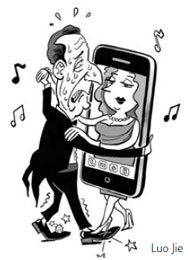I've just become a jailbreaker and I don't feel guilty at all. No, I haven't escaped from prison. My "crime" is to have put software I like on the great toy that now follows me everywhere, my shiny black iPhone.
Doing what you want with your possessions isn't usually a problem - Microsoft, for instance, doesn't stop you using Firefox on your PC and ditching Internet Explorer, or preferring Yahoo Messenger over MSN - but Apple has such a proprietary attitude to their little treasure I half expect them to come knocking on my door at any moment.
Ironically, I traveled more than 10,000 km to buy a perfectly legal iPhone ... and with one click of a button, have rendered it liable to crash if I inadvertently press the wrong button.
As a budding (albeit over-aged) geek, I developed an obsession with the iPhone some months ago. Since its launch in 2007 it has revolutionized the IT industry, even more than its older brother, the iPod, did seven years ago - and for good reason. It is a whole multimedia world in one slick device - cell phone, music and video player, camera, picture viewer and digital diary. Best of all, it offers free Wi-Fi (wireless Internet access) if it's available in your area, GPS and can run useful other software, like dictionaries and digital books.
Just like Bill Gates' wife and millions of others, I wanted to get my hands on one.
Beijing's computer district, Zhongguancun, was the obvious place to go but even there it didn't come cheap - 4,000 yuan ($584) for the 8Gb model and 5,200 yuan for the 16Gb one. Moreover, a friend warned me to be careful where I shopped at Zhongguancun because some outlets were unreliable.
A major problem is that Apple has always tied the hardware with a cellphone contract, originally in the United States and more lately, to approved providers elsewhere. Websites and YouTube videos now abound with advice on how to "unlock" your phone and make it usable without paying further, hefty monthly charges.
On a short trip to Auckland, however, I discovered to my delight that NZ is one of the few places you can buy it legally and without a network contract. Even better, at $1,129 NZD ($563) the 16Gb phone was far cheaper than even Zhongguancun. Deal done.
On returning to Beijing, I learned that everything you put on the phone must be channeled through iTunes, Apple's online store. But some of the best iPhone software, including free video recorder, is only available through rival providers.
As I researched what to do, I found myself in an on-line nether world of geeks, blogs and overwhelmed by lingo I'd never heard before. It turned out that in order to access your desired programs you needed to install intermediary software called Quickpwn, Installer and Cydia. This made you a "jailbreaker" (someone who's bypassed Apple and hacked into their own phone) and at risk of turning your toy into a "brick" (frozen and unable to use).
It became incredibly complicated but suffice to say, many hours later, I finally had my free video recorder. Apple doesn't give in easily, though. Every time you "sync" your phone with your PC to update your music, software and diary, it deletes files you've downloaded separately and I still cannot update the "firmware", which drives the phone.
Last word to "Ed", an angry poster on iphonehacks.com: "Come on Apple, they're our phones. We paid for them." Too true. I also reckon that hold on, there's someone at the door.
(China Daily March 24, 2009)